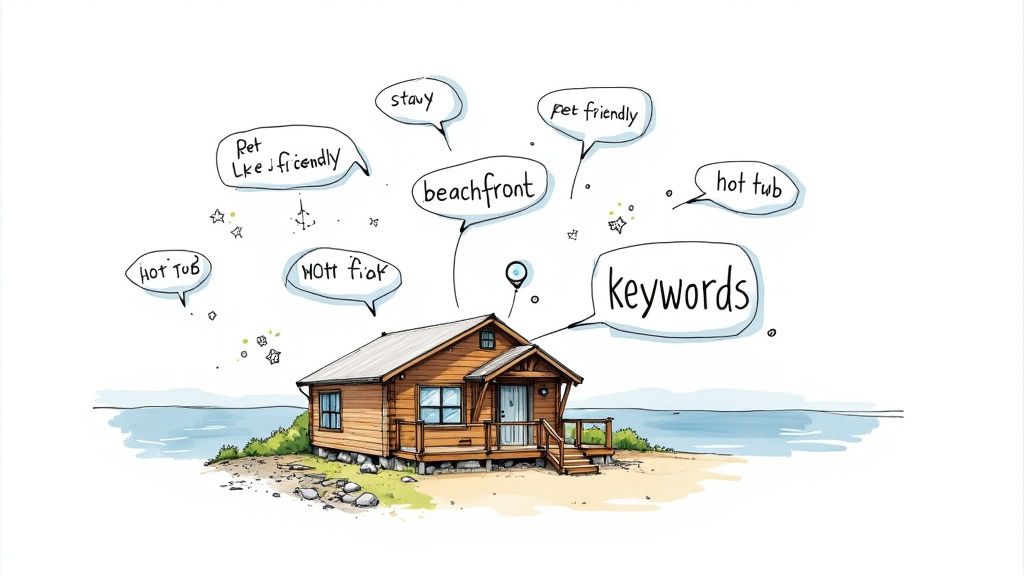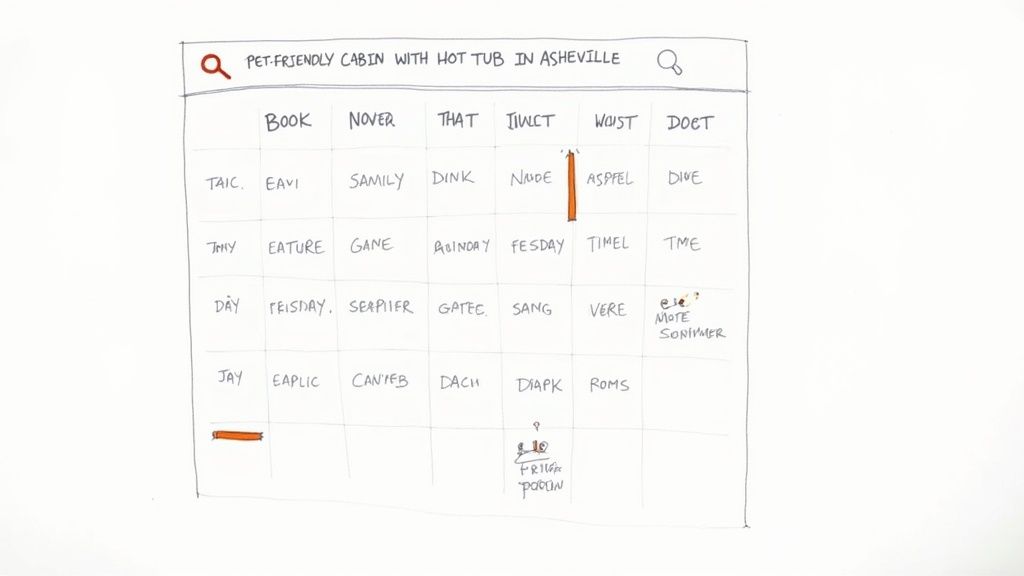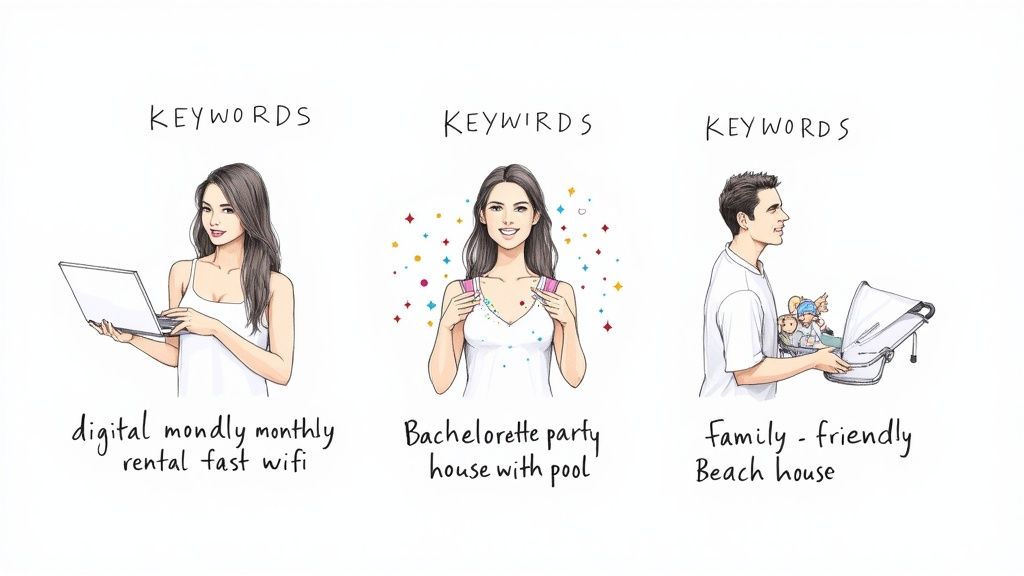
vacation rental keywords
Vacation Rental Keywords to Maximize Bookings
Posted on Nov 20, 2025

Vacation rental keywords are simply the words and phrases your future guests are typing into Google, Airbnb, and Vrbo to find their next stay. These terms are the bridge connecting your property with the exact traveler looking for what you offer. Get them right, and a simple listing transforms into a high-visibility, booking magnet.
The Foundation of a Booked-Out Calendar

Let’s be honest: getting your property seen online isn’t just half the battle; it's the entire first act. Your stunning photos and carefully crafted descriptions won't matter if nobody ever finds them. This is precisely why a smart keyword strategy is the bedrock of your marketing, whether you're on the big OTAs or driving traffic to your own direct booking site.
Think about it this way. Online, your property is just a collection of data points. Search algorithms use those data points to match a listing with a traveler's search query. The right vacation rental keywords make sure those data points line up perfectly with what your ideal guest is searching for.
Moving Beyond Generic Descriptions
So many hosts fall into the trap of thinking too broadly. They'll use vague terms like "beach house" or "mountain cabin." And sure, those are accurate, but they're also incredibly competitive. Casting a net that wide means you're trying to attract everyone, which often results in attracting no one.
The real magic happens when you get specific. The difference between "beach house" and "pet-friendly oceanfront house with fenced yard in Destin" is enormous. The first term is for someone who's just dreaming; the second is for someone who's ready to book.
Key Takeaway: Stop selling a generic property and start marketing a specific experience. Your goal is to use the exact language your target guest uses when they search, transforming your listing from a needle in a haystack to the perfect answer to their travel dreams.
This strategic shift has never been more critical. The global vacation rental market is expected to balloon from USD 97.85 billion in 2025 to USD 134.26 billion by 2034, fueled by a travel boom and a massive preference for online booking. With younger travelers projected to make up 75% of Airbnb's customer base by the end of 2025, you have to meet this digitally native audience where they are—and that means using a precise, data-backed approach.
The Language of Your Ideal Guest
Put yourself in the shoes of a few different guests and consider how their searches would change based on their needs:
- The Remote Worker: They aren't just searching for a "cabin in Asheville." They're looking for an "Asheville cabin with fast WiFi and dedicated workspace for long stay."
- The Family on Holiday: Their search isn't a generic "condo in Orlando." They need a "3-bedroom condo near Disney with a pool and free parking."
- The Bachelorette Party Planner: She has a very specific request: "Palm Springs house for 10 guests with pool and hot tub."
Each of these examples uses what we call long-tail keywords—longer, more descriptive phrases that signal a strong intent to book. By weaving these specific terms into your listings and website, you filter out the casual window-shoppers and connect directly with guests who are ready to click "book" because you’ve already answered their most important questions before they even had to ask.
A solid grasp of core search engine ranking factors is fundamental to any strategy aimed at boosting online visibility for your properties.
Ultimately, building a strong keyword foundation isn't just a technical SEO task. As we explore in our in-depth guide to SEO for vacation rentals, it’s a core part of hospitality. It’s about understanding your guests so deeply that you can anticipate their search terms and be there with the perfect solution. That proactive mindset is what fills calendars and builds a thriving rental business.
How to Uncover High-Impact Keywords

Finding the right vacation rental keywords isn't about guesswork or stumbling upon a magic formula. It’s a repeatable process of discovery. This is where you roll up your sleeves and dig into the exact phrases real guests are typing into Google to find properties just like yours.
Forget generic lists. Your goal here is to build a unique keyword arsenal that perfectly captures your property's specific charm and, most importantly, its location. The whole thing starts not with a tool, but with a good, old-fashioned brainstorm about what makes your rental special.
Start With Your Property's Story
Before you even touch a keyboard, grab a notebook. We need to get the core topics related to your rental down on paper. This initial brain dump is the raw material for everything that follows.
- Property Type & Style: Is it a rustic cabin? A sleek downtown loft? Maybe a sprawling villa or a cozy cottage? Get descriptive.
- Key Amenities: Go deep here. Don't just list "pool." Is it a "heated saltwater pool" or a "private hot tub with mountain views"? Think about the details that matter: "fenced yard for dogs," "EV charger," or a "fully stocked chef's kitchen."
- Target Guest: Who are you really trying to attract? The keywords for a "family-friendly rental" are worlds away from those for a "romantic getaway for couples" or a "long-stay for digital nomads."
- Local Attractions & Activities: What’s actually nearby? Name the specific landmarks, restaurants, hiking trails, or event venues. A guest isn't just booking a house; they're booking an experience in a location.
This simple exercise gives you a set of "seed keywords"—the foundational terms you’ll build on. For example, if you own a ski chalet in Colorado, your seeds might be something like "Breckenridge ski condo," "ski-in/ski-out access," "hot tub," and "family ski trip." Simple, but powerful.
Use Free Tools to Find What Guests Are Actually Searching For
You don't need to spend a fortune on software to find great keywords. Some of the best tools are completely free and give you a direct line into real-world search behavior.
Honestly, one of the best places to start is Google itself. Type your seed keywords into the search bar and watch the autocomplete suggestions. These aren't random—they're the most popular searches related to what you've typed. It's a goldmine.
Another favorite is the "People Also Ask" section in the search results. This shows you the exact questions travelers are asking, which is perfect for sparking ideas for your blog or FAQ page. A search for "things to do in Miami" might show questions like "What is the best month to visit Miami?" or "Is South Beach family-friendly?" Answering these on your site immediately positions you as a local expert.
When you're ready for more structured data, head over to Google Keyword Planner. It’s built for advertisers, but it’s fantastic for organic research. You can plug in your seed keywords to find related terms, see their average monthly search volume, and get a feel for the competition.
Here is an example of what you'll see inside the tool when you start discovering new keywords.

This view is incredibly useful. You don’t just get keyword ideas; you see their monthly search trends, which is critical for understanding seasonal demand.
Spy on Your Top-Performing Competitors
Guess what? Your competitors are doing a lot of the heavy lifting for you. Analyzing the top-ranking properties in your area gives you a clear roadmap of what's already working with both search engines and guests.
Start by searching for your main keywords, like "Miami condo rental" or "Colorado ski chalet." Open the top 3-5 results from direct booking sites—ignore the big OTAs like Airbnb or Vrbo for now.
Now, it's time to do some snooping:
- Check their page titles and main headings. What specific words are they using?
- Read their property descriptions. Are they highlighting certain amenities or experiences over others?
- See if they have a blog. What are they writing about? Posts on local events or seasonal guides are often packed with valuable keywords.
This isn’t about copying them. It's about spotting patterns and, more importantly, finding gaps. Maybe every competitor is shouting about being "family-friendly." That could be your cue to carve out a niche by targeting "pet-friendly luxury rentals" or "work-from-anywhere stays."
This diversified global growth underscores the vacation rental industry's transition from a niche market segment to a mainstream accommodation option. The global market, valued at USD 174.84 billion in 2024, is projected to soar to USD 396.93 billion by 2032. This explosive growth means more competition, making a precise keyword strategy more important than ever. You can discover more insights about the vacation rental market's future on fortunebusinessinsights.com.
Organize Your Findings for Action
As you collect keywords, things can get messy fast. The final step is to bring some order to the chaos by grouping them into categories based on what the guest is trying to do. This framework is key to using the right keywords in the right places.
- Dreaming/Informational Intent: These are from people at the very beginning of their planning. Think: "best time to visit the Smoky Mountains," or "things to do in Scottsdale." These are perfect for blog posts.
- Ready-to-Book/Transactional Intent: These folks are ready to pull out their credit cards. Keywords like "book downtown Austin condo," or "Asheville cabin with hot tub prices" have high booking intent. These belong on your homepage and property pages.
- Location-Based Intent: Hyper-specific to a place. Examples include "rental near Pike Place Market" or "South Beach oceanfront condo."
- Amenity-Based Intent: All about the features. Think: "vacation rental with private pool" or "pet-friendly cabin with fenced yard."
By sorting your vacation rental keywords this way, you create a strategic blueprint. You’ll know exactly which terms to weave into a blog post to attract new eyes and which ones to place front-and-center on your booking page to turn those lookers into bookers.
Weaving Keywords Into Your Listings

Having a perfectly researched list of vacation rental keywords is great, but it's just potential energy. It only becomes a real, booking-driving force when you strategically place those terms where they matter most. This is where the rubber meets the road—translating your research into action by weaving your keywords into the very fabric of your listings so they click with both guests and search algorithms.
The trick is to keep it natural. Your goal is always to write for humans first, search engines second.
When your writing is helpful, clear, and compelling, it naturally gives the algorithms what they're looking for: a great user experience. Forced, awkward phrasing—what the pros call keyword stuffing—will send potential guests running and can even get your listings dinged by search platforms.
Optimizing Your Direct Booking Website
Your direct booking website is the digital property you own outright, giving you total control over your SEO. This is your home turf, where you can implement a keyword strategy with the most depth and creativity. It's also the best place to attract those savvy travelers who are actively trying to dodge the extra fees on major booking platforms.
Focus your efforts on the spots that search engines weigh most heavily.
- Page Titles (or Title Tags): This is the main headline that shows up in a browser tab and on Google's search results page. You could argue it's the single most important on-page SEO element.
- Headings and Subheadings (H1, H2, H3): These give your content structure for readers and signal to search engines what the page is about. Your main page heading (the H1) should always feature your primary keyword.
- Body Text: Your property descriptions, local guides, and blog posts are where you can naturally sprinkle in a wider range of long-tail and secondary keywords.
- Image Alt Text: This text describes an image for search engines and visually impaired users. Instead of a generic "photo of kitchen," write something descriptive like, "fully-stocked chef's kitchen with granite countertops."
Let’s see how this works for a hypothetical property page.
Primary Keyword: luxury Gatlinburg cabin with hot tub
H1 Heading: Luxury Gatlinburg Cabin with a Private Hot Tub
Page Title: Book Our Luxury Gatlinburg Cabin with Hot Tub & Mtn Views
Body Text Snippet: "...after a day of exploring the Smokies, unwind in your private hot tub. This family-friendly Gatlinburg cabin rental is the perfect basecamp..."
This approach creates a clear, consistent signal to Google about what the page is about, improving its chances of ranking for those high-value terms.
Applying Keywords on OTAs Like Airbnb and Vrbo
While you have less technical control on Online Travel Agencies (OTAs), the principles are just as crucial. On platforms like Airbnb and Vrbo, the competition is fierce, and your word choice directly impacts how often you show up in search results.
You need to zero in on the fields that pack the biggest punch with both guests and the platform's algorithm.
- Your Listing Title: This is your digital billboard. It's often the first—and sometimes only—thing a guest reads. A killer title includes your most powerful booking keywords and a key selling point that makes you stand out.
- The "Summary" or First Paragraph: Most OTAs show a short preview of your description. Those opening sentences have to be compelling and contain core keywords that hook the reader immediately.
- Photo Captions: Don't sleep on these! Captions are a fantastic, often-overlooked spot to add context and sprinkle in amenity-based keywords. A photo of your patio becomes, "Enjoy morning coffee on the private patio with stunning ocean views."
The idea is to answer a guest's main questions before they even have to ask.
Real-World Examples: Before and After
Seeing the transformation in action really makes the concept click. Let’s take a couple of generic listing titles and descriptions and rewrite them to be keyword-rich and way more compelling.
Example 1: The Generic Beach Condo
- Before Title: Nice Condo in Miami
- Before Description: "This is a 2-bedroom, 2-bath condo. It has a kitchen and a balcony. Enjoy your stay in Miami."
This tells a guest almost nothing and contains zero specific keywords that will help it rank. It’s forgettable.
- After Title: Oceanfront South Beach Condo w/ Balcony & Pool Access
- After Description: "Wake up to stunning ocean views from your private balcony at our South Beach condo. This modern 2-bedroom rental is perfect for families, just steps from the sand and with full access to the resort pool. Your perfect Miami beach getaway awaits."
The "after" version is packed with valuable vacation rental keywords like "oceanfront South Beach condo," "private balcony," "resort pool," and "Miami beach getaway." It paints a picture and directly targets what guests are actually searching for. For more inspiration, check out these powerful property description examples that turn lookers into bookers.
Example 2: The Vague Mountain Cabin
- Before Title: Cozy Cabin in the Woods
- Before Description: "A nice cabin for a weekend away. It has a fireplace and is located near town. A great place to relax."
Again, totally forgettable. It misses every opportunity to target specific traveler needs and desires.
- After Title: Pet-Friendly Asheville Cabin w/ Hot Tub & Fireplace
- After Description: "Escape to our pet-friendly Asheville cabin, your perfect romantic getaway. Unwind in the private hot tub under the stars or get cozy by the wood-burning fireplace. Located just 10 minutes from downtown, it's the ideal basecamp for exploring the Blue Ridge Mountains."
Key Insight: The "after" description uses high-intent keywords like "pet-friendly Asheville cabin," "private hot tub," and "romantic getaway." It targets a specific type of guest and highlights the most desirable amenities, dramatically increasing its chances of being found and booked.
Targeting High-Value Guest Niches

This is where you stop shouting into the void and start having real conversations. Winning the booking game isn't just about getting seen; it's about getting seen by the right people—the guests who will pay a premium for a property that’s a perfect fit for their needs.
Think about it. A generic keyword like "Miami condo" is a shot in the dark. But a specific, long-tail keyword like "digital nomad monthly rental with fast wifi in Miami" is a direct line to someone ready to book exactly what you offer. That's the power of niche targeting.
This approach lets you cut through the noise of a saturated market. You’re no longer just another listing; you’re the answer to a traveler’s very specific problem, which is how you justify higher rates and land those longer, more profitable bookings.
Identifying Your Most Valuable Guest Avatars
So, who are these high-value guests? The first step is figuring that out for your own properties. Is your two-bedroom condo with a crib and high chair a goldmine for young families? Or is your remote cabin an ideal retreat for couples looking for an anniversary getaway?
Pick two or three of these core guest "avatars" and start thinking like they do. What are they searching for? What amenities do they really need?
- The Digital Nomad: This guest isn't on vacation; they're working. They crave productivity and comfort, so their searches are all about long-term stays and office-level amenities.
- The Bachelorette Party Planner: This person is on a mission to create an unforgettable, Instagram-worthy experience. They're looking for group-friendly spaces, entertainment, and unique features that pop in photos.
- The Multi-Generational Family: This group is juggling the needs of kids, parents, and grandparents. They need space, accessibility, and things to do that will keep everyone from a toddler to a retiree happy.
Once you’ve defined these personas, the guesswork stops. You can build keyword strategies that actually connect with the people you want to host.
Building Keyword Sets for Niche Travelers
Now that you know who you're talking to, you can build dedicated lists of long-tail vacation rental keywords for each persona.
Let’s put this into practice.
For the "Digital Nomad" eyeing your downtown loft, you might use:
- "long-stay apartment with dedicated workspace"
- "monthly rental with gigabit internet"
- "walkable condo for remote workers"
- "extended stay with ergonomic chair"
And for the "Bachelorette Party" looking to book your suburban house with a pool:
- "bachelorette party house with pool for 12"
- "Instagrammable rental for girls trip"
- "large group house near downtown nightlife"
- "rental with hot tub and outdoor speakers"
Key Takeaway: See how specific these are? They go way beyond bed counts. They speak to the experience the guest is trying to create. This level of detail drastically cuts down your competition and sends your conversion rates soaring.
Leveraging Seasonality and Local Events
The best keyword strategies aren't static—they're alive, adapting to the calendar. Your most valuable guests often plan trips around seasons or can't-miss local events, and your marketing language needs to keep up.
This means your property’s identity might shift with the weather. A "summer hiking basecamp" in Vermont effortlessly becomes a "cozy ski-in/ski-out chalet" once the snow starts to fall.
- Summer Keywords: Think terms like "rental with outdoor grill," "property near hiking trails," or "home with lake access."
- Winter Keywords: Pivot to "cabin with wood-burning fireplace," "ski vacation rental," or "cozy getaway for New Year's."
This seasonal shift is critical. In North America alone, the short-term rental market is projected to hit a volume of USD 24.78 billion by 2029, with demand in major cities finally outpacing supply. You can dive into the full research on these short-term rental market dynamics to get ahead of the trends.
To capture a piece of that growing pie, you have to be relevant. Tailoring your keywords to the time of year ensures you're connecting with guests who are searching with timely, specific intent. You’re not just finding any guest; you're finding the right guest at the perfect time.
How to Track and Refine Your Keyword Strategy
Rolling out your keywords is just the beginning. Your keyword strategy isn’t something you can just set and forget. Guest search behavior is constantly changing, new competitors are always popping up, and the OTAs love to tweak their algorithms.
To stay on top, you need a simple feedback loop: implement your keywords, track what happens next, and then adjust your strategy based on real-world data. This isn't about getting lost in spreadsheets. It's about knowing which handful of metrics actually lead to bookings and where to find them. This approach keeps your vacation rental keywords fresh and your calendar full.
Monitoring Your Direct Booking Website
When it comes to your own website, Google gives you everything you need for free. Your command center is a combination of two powerful tools: Google Analytics and Google Search Console. Together, they paint a clear picture of how people are finding you and what they do once they land on your site.
Google Search Console (GSC): Think of this as your direct line to Google. GSC shows you the exact search terms people are using to find you, what your average ranking is for those terms, and your click-through rate (CTR). If you see a high ranking for "pet-friendly cabin Asheville" but the CTR is disappointingly low, that’s a huge clue your page title or meta description isn't grabbing enough attention.
Google Analytics (GA4): This tool picks up where GSC leaves off, telling you what happens after someone clicks. You can see which pages are getting the most traffic, how long visitors are sticking around, and the most critical metric of all: your conversion rate. That’s the percentage of visitors who actually complete a booking.
Pro Tip: Make sure you set up conversion goals in Google Analytics to specifically track completed bookings. This lets you draw a direct line from organic traffic generated by certain keywords all the way to revenue, giving you undeniable proof of what's working.
Analyzing Performance on OTAs
Platforms like Airbnb and Vrbo have their own built-in analytics, and while they aren't as deep as Google's tools, they provide vital clues about your performance within their ecosystems.
You'll want to keep a close eye on these key metrics:
- Impressions/Views: This is simply how many times your listing shows up in search results. If you see a sudden drop, it could mean a new competitor just entered the market or the platform changed its algorithm.
- Click-Through Rate (CTR): This is the percentage of people who click on your listing after seeing it. A low CTR is often a sign that your main photo or listing title just isn't compelling enough to beat the competition.
- Booking Rate: This is the ultimate measure of success. High views but a low booking rate? That’s a red flag that something in your listing—maybe the description, photos, or pricing—needs a second look.
Let's say you update a listing title with new seasonal keywords like "cozy ski-in/ski-out condo." Check these metrics a week later. Did views jump? Did you get more inquiries? This direct feedback is what drives smart, continuous improvement. To really boost the long-term authority of your keywords, exploring Digital PR Link Building Strategies can be a game-changer.
Tracking performance is more than just glancing at charts; it's about understanding the story the numbers are telling you. For a more detailed look at measuring your marketing efforts, our guide on UTM best practices offers a fantastic framework for figuring out what's truly driving your direct bookings. This cycle of analyzing and refining is what separates the most successful hosts from everyone else.
Got Questions? We've Got Answers
Digging into vacation rental keywords always sparks a few questions. Let's tackle some of the most common ones property managers ask so you can sharpen your strategy and start seeing more bookings.
How Often Should I Refresh My Keywords?
Your keyword strategy isn't a "set it and forget it" task—it's a living part of your marketing. I recommend a deep dive every 6-12 months. This is your chance to see what's working, what's not, and adjust to bigger trends in how guests are searching.
But don't wait that long to make smaller tweaks. You should be making quick adjustments for seasonal shifts—think swapping "summer beach rental" for "cozy fall getaway." Or, when a big local event like a music festival is coming up, you'll want to get those keywords in place ahead of time. And if you add a killer new amenity like a hot tub or an EV charger? Get those keywords updated immediately to catch that new wave of demand.
Should I Go for Popular Keywords or Stick to Niche Ones?
The best approach isn't an either/or—it's a smart mix of both. Think of it like a well-balanced investment portfolio, where different assets have different jobs.
- Broad, popular keywords like 'Orlando villa' are fantastic for casting a wide net. They get your listing in front of a ton of people who are still in the early, dreamy stages of planning their trip.
- Specific, niche keywords like 'villa near Disney with private pool' are your closers. They attract guests who know exactly what they want and are much closer to hitting that "book now" button. There’s less competition, and the traffic is way more likely to convert.
A healthy strategy uses both to capture guests at every stage of their search.
Can I Just Use the Same Keywords Everywhere?
While your core keyword list will be your foundation, you can't just copy and paste it across every platform. You have to play by the rules of each channel.
Your direct booking website is your home turf. Here, you have the space to go deep. It's the perfect spot for blog posts targeting those longer, more detailed informational keywords. But on sites like Airbnb and Vrbo, real estate is limited. You need to prioritize your most powerful, high-intent keywords right in your listing title and the first couple of sentences of your description to make an instant impact.
My Biggest Piece of Advice: The number one mistake I see hosts make is "keyword stuffing"—jamming awkward phrases into sentences where they just don't fit. It reads terribly, creates a horrible guest experience, and can actually get you penalized in search rankings. Always, always write for people first and search engines second. A natural, helpful, and compelling description will win every time.
Ready to stop guessing and start booking? hostAI uses advanced AI to optimize your listings, automate your marketing, and drive more direct revenue. See how it works.